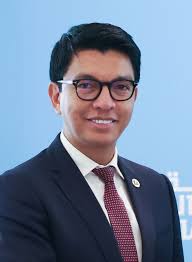Understanding President Andry Rajoelina’s Leadership in Madagascar

Introduction
President Andry Rajoelina has been a pivotal figure in Madagascar’s political landscape since his rise to power amid tumultuous times. His leadership and policies are relevant not only to the citizens of Madagascar but also to international observers concerned with stability in the Indian Ocean region. Rajoelina’s presidency has seen a mix of support and criticism, shaping Madagascar’s socio-economic environment.
Political Journey
Andry Rajoelina first became prominent in 2009 when he ousted then-President Marc Ravalomanana in a coup that resulted in significant unrest. After leading a transitional government, Rajoelina was elected president in 2019, promising reforms and economic recovery. His tenure has been marked by ambitious infrastructure projects and attempts to stimulate local economies, although these efforts have garnered mixed reactions.
Economic Developments
Under Rajoelina’s presidency, Madagascar has seen initiatives aimed at attracting foreign investment, particularly in sectors like mining and agriculture. In 2023, he announced significant investments in renewable energy, aiming to diversify the energy sources for the country. These steps are crucial for a nation still grappling with high levels of poverty and unemployment, with nearly 75% of its population living on less than $1.90 a day according to World Bank data.
Challenges and Criticisms
However, Rajoelina’s administration has faced significant challenges, including allegations of corruption and questions over the transparency of governmental processes. Political opponents have often criticized his administration for not adequately addressing the needs of the most vulnerable populations. Protests in 2023 highlighted ongoing dissent against economic disparities and demands for greater governmental accountability.
Conclusion
The significance of President Andry Rajoelina’s leadership cannot be overstated, as it serves as a reflection of Madagascar’s struggles for stability and economic development. As he approaches the midway point of his term, the effectiveness of his policies will be under scrutiny, with implications not just for Madagascar, but for regional geopolitics. Moving forward, the balancing act between economic growth and political stability will be essential for fostering a brighter future for the Malagasy people.







